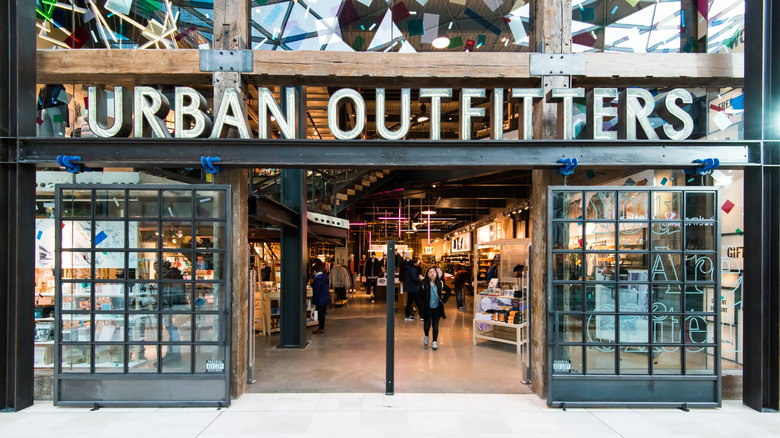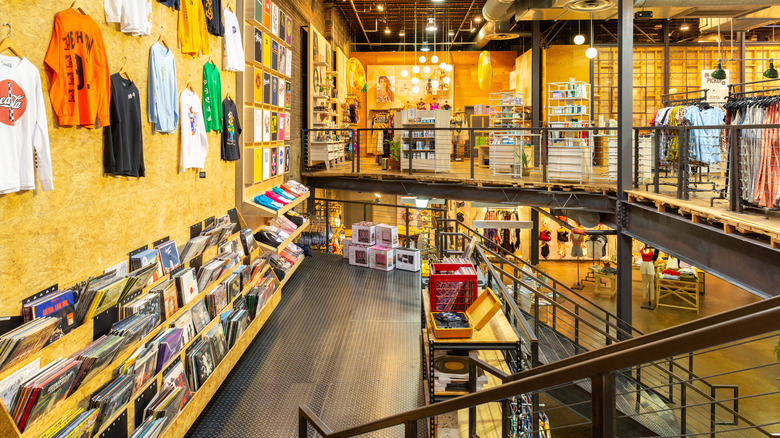The Reason You Should Avoid Shopping At Urban Outfitters
From boho style to '90s fashion, Urban Outfitters has long been the go-to spot for buying trendy items for young adults. With the recent rise of '90s fashion and beauty, it's easy to see why the company is seeing rising sales. According to PYMNTS, Urban Outfitters saw an increase in the 2021 Q4 of 13.9% compared to the same time frame in 2020. There's no doubt that this increase is due to the store's street style and nostalgic branding it is known for having.
However, like many other fast fashion stores, Urban Outfitters is not exempt from controversies. Like its competitors, Zara and H&M, Urban Outfitters has seen itself embroiled in numerous scandals ranging from sustainability practices to copyright issues. Although these scandals brought a significant backlash, it seems like it has not affected the store's profits. However, if you want to be proud of where you shop, you may want to take another look at Urban Outfitters.
Urban Outfitters has showed a lack of sustainability
One of the biggest distrust consumers have with Urban Outfitters is the lack of sustainability by the company. While there's plenty of work to be done with fast fashion, in general, many stores have taken steps to be transparent with its sustainability. Urban Outfitters has decided not to take this step but has become silent about how it plans to become more environmentally friendly. According to Good On You, Urban Outfitters has not made the necessary steps to become environmentally friendly. The lack of action from the company has landed it on the "Not Good Enough" list for Good On You. This label is given to stores that have taken little to no steps to improve their impact on the environment.
Eco-Stylist explains that Urban Outfitters' biggest sustainability problems stem from the fact that it doesn't disclose the production location of its products. With zero knowledge of what factories are making their products, it's impossible to know if they're made with eco-friendly materials or in fair labor conditions. Urban Outfitters does not track essential factors such as carbon emissions, water waste, air pollution, CO2, or hazardous chemicals.
With no recycling program for its materials, it seems like Urban Outfitters is not interested in making any changes to improve its carbon footprint.
Urban Outfitters has been accused of stealing designs
On multiple occasions, Urban Outfitters has found itself involved in scandals that accuse the brand of stealing designs belonging to independent artists.
In 2012 the company was sued by the Navajo Nation for copyright infringement. Global Citizen explains that Urban Outfitters used the terms "Navajo" and "Navaho" for the names of several of their products. Part of this case also related to the fact that many prints and patterns Urban Outfitters used were Navajo Nation's symbols to confuse consumers into thinking they were Native American works.
Urban Outfitters has also found been accused of stealing from independent artists. CBC explains that in 2020, a Canadian artist called out the company for stealing her resin designs. The artist, Lee Meszaros, explained that the company reached out to her to potentially collaborate on resin designs for the company in April 2019. Once Meszaros sent Urban Outfitters a proposal, complete with her rates, the company declined to pursue the partnership in July 2019 after receiving samples of the products. However, in March 2020, there were almost identical products on the Urban Outfitters website. After a significant social media backlash, Urban Outfitters removed the items and explained the products had been in production since April 2019 but removed them out of respect for Meszaros.


